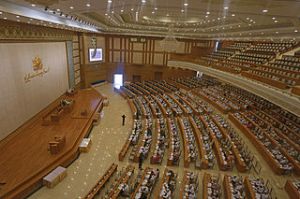Risky Business: ‘First mover advantage’ or risk in Myanmar’s gold rush?

In the past year Myanmar has moved to the center of the frontier markets’ map for investors keen on a “first mover advantage”. However, increasingly lost amidst the hype is the recognition that with “first mover advantage” comes “first mover risk.”
A house divided? Investors in Myanmar must recognise the risks of political instability and reputational damage
Following Myanmar’s elections last spring, the United States took a number of steps to ease existing sanctions against Myanmar in an effort to promote democracy and economic reform. Liberalization and reform—and the surrounding hype—have subsequently encouraged the view that Myanmar presents a great opportunity for investment. The country’s natural resource wealth, large and young population, and strategic position between the fast-growing economies of China and India draw investors to Myanmar. Stoking their ardor is a new foreign investment law and an easing of rules for incorporating foreign companies.
Myanmar may have embarked on significant economic reforms in 2012 to make it a more investor-friendly place, but it has entered 2013 ranked as an “extreme risk” for foreign companies doing business in the country. According to a report by risk consulting firm Maplecroft, it shares the world’s worst top-10 slots with Somalia, Congo, Sudan, Afghanistan, Iraq, Libya, Central African Republic, Syria and Yemen. Issues including an antiquated financial system, poor infrastructure, unskilled labor force, lack of hard data, and a government bureaucracy that is ranked bottom by Transparency International put early investors at significant risk. The risks to investment in Myanmar’s potentially fractious political climate and dangerously fragile economy go beyond these structural challenges to less-cited political risks, including physical insecurity, reputational damage, and investment-driven instability.
Continued religious and ethnic violence in Myanmar calls into question aggressive investment in the short term. According to Maplecroft, the booming tourism industry faces the most vulnerability, with the negative impact quickly spreading to the retail and infrastructure sectors. While the important oil and gas industry is unlikely to be directly disrupted by the present level of sectarian trouble, the Ministry of Energy’s plans to hold international auctions for up to 20 offshore exploration licenses has been delayed since last September; of note is the fact that many of these sea blocks are adjacent to the coastal Arakan region where many of Myanmar’s Muslims live. Religious and ethnic violence could cause problems for supporting logistical work such as transport, and further widespread could create hazards to personnel operating in the vicinity, which would be an additional disincentive for commercial development.
Doing business in Myanmar, still ripe with corruption and ethically questionable partners, could serve as an investment-undermining reputational risk for Western companies. It is considered unwise to operate in Myanmar without a local partner as the nation does not have a strong rule of law. Unfortunately for potential investors, it is difficult to find Burmese business partners that do not have junta connections. Take, for example, the country’s gas stations, potentially a great investment in a frontier market where many people are poised to grow rich enough to buy mopeds and eventually even cars. Two hundred and forty-seven state-owned stations that were privatized in 2010 were sold at low prices to a military-owned trading company and other firms with close ties to the junta. Ultimately, working with the military and former junta officials could raise the risk of a boycott at home or—at the extreme—a U.S. Foreign Corrupt Practices Act investigation.
Even if an investor is able to look past the risks of insecurity or secure an uncorrupted partnership, they will still face the risk of investment driven instability. While the lure of rapid growth can be hard for investors to resist, it should be noted that waves of foreign direct investment chasing high returns have overwhelmed fragile, newly opened economies in the past. Often times these countries experience wild swings in exchange rates, monetary supply, and inflation derived from lack of fiscal discipline and strong monetary controls. A lack of standards increases the likelihood of creating financial bubbles as banks race to lend, with a raft of questionable real estate projects (e.g. Thailand in the late 1990s) following. According to Brian P. Klein, former Director of Southeast Asia Affairs at the Office of the U.S. Trade Representative, the sudden inflow of foreign direct investment may recede just as quickly at the first sign of instability.
It would unfair to not recognize that Myanmar could, certainly, provide great returns on its risky business. Myanmar has come a long way for such a short time in reforming politically and economically, and the government appears to be trying to address key issues that would deter foreign investors such as transparency. It is also actively opening up sectors that have for a long time been closed to any form of foreign investment. However, even if Myanmar manages to stay on its current path of economic and political change, the obstacles and challenges it faces will take a considerable amount of time and effort to overcome. It would be wise for investors to approach Myanmar’s investment risks—potential physical insecurity, reputational damage, and investment-driven instability—with active caution.
Note: The post is part of two op-eds addressing investment in Myanmar by Taylor Wettach and Michael Madoff. This piece cautions potential investors in Myanmar, emphasizing the political risks. Its companion piece encourages investment in Myanmar and US policy change.










